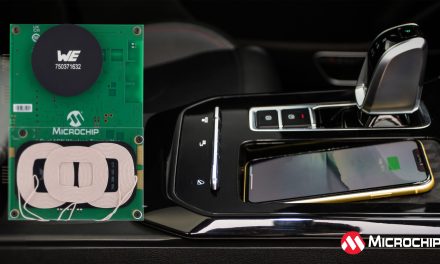 Microchip has announced a new family of CAN FD (Controller Area Network Flexible Data-Rate) transceivers, the MCP2561/2FD. As an interface between a CAN protocol controller and the physical two-wire CAN bus, these transceivers can serve both the CAN and CAN FD protocols. This product family not only helps automotive and industrial manufacturers with today’s CAN communication needs, but also provides a path for the newer CAN FD networks that are increasingly in demand.
Microchip has announced a new family of CAN FD (Controller Area Network Flexible Data-Rate) transceivers, the MCP2561/2FD. As an interface between a CAN protocol controller and the physical two-wire CAN bus, these transceivers can serve both the CAN and CAN FD protocols. This product family not only helps automotive and industrial manufacturers with today’s CAN communication needs, but also provides a path for the newer CAN FD networks that are increasingly in demand.
In-vehicle networking growth continues to be driven by the need for electronic monitoring and control. As application features increase in power train, body and convenience, diagnostics and safety, more Electronic Control Units (ECUs) are being added to existing CAN buses, causing automotive OEMs to become bandwidth limited. In addition, the end-of-line programming time for ECUs is on the rise due to more complex application programmes and calibration, which raises production-line costs. The emerging CAN FD bus protocol solves these issues by increasing the maximum data rate while expanding the data field from 8 data bytes up to 64 data bytes.
With their robustness and industry-leading features, including data rates of up to 8 Mb/s, Microchip’s MCP2561/2FD transceivers enable customers to implement and realise the benefits of CAN FD. These new transceivers have one of the industry’s lowest standby current consumption (<5 µA typical), helping to meet ECU low-power budget requirements. In addition, these devices support operation in the -40 to 150 degrees Centigrade temperature range, enabling usage in harsh environments.
The new family of MCP2561/2FD CAN FD transceivers is available in 8-pin PDIP, SOIC and 3×3 mm DFN (leadless) packages, providing additional design flexibility for space-limited applications. The family also provides two options: The MCP2561FD comes in an 8-pin package and features a SPLIT pin. This SPLIT pin helps to stabilise the common mode in biased split-termination schemes. The MCP2562FD is available in an 8-pin package and features a Vio pin. This Vio pin can be tied to a secondary supply in order to internally level-shift the digital I/Os for easy microcontroller interfacing. This is beneficial when a system is using a microcontroller at a Vdd less than 5V (for example, 1.8V or 3.3V), and eliminates the need for an external level translator, decreasing system cost and complexity.
These new Microchip MCP2561/2FD transceivers will be used to test CAN FD network designs at a Plug Fest organised by the CAN in Automation (CiA) Interest Group, on Tuesday March 25th in Detroit, Michigan. Both Kvaser, a supplier of advanced CAN solutions to engineers designing and deploying systems across a wide range of industries, and Intrepid Control Systems will use Microchip’s transceivers on their respective CAN FD boards at this event. Intrepid Control Systems supplies the neoVI, ValueCAN and WaveBPS CAN testing products to all major automotive OEMs.
The MCP2561FD and MCP2562FD transceivers are both available now for sampling and volume production.



